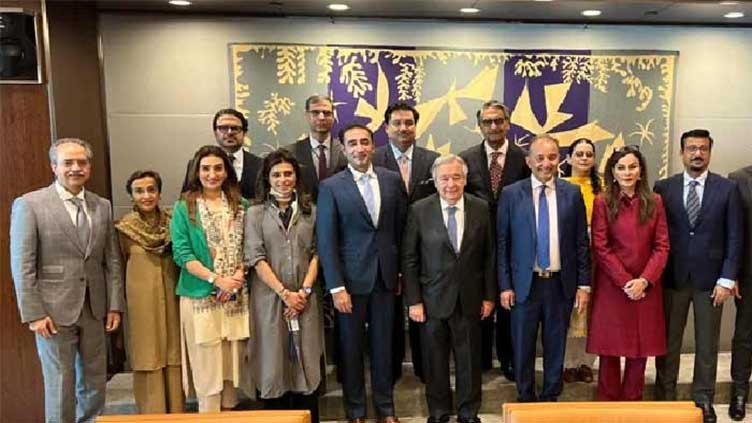Bilawal tells UN chief India's belligerent posture risks peace in region

Pakistan
Seeks UN’s active role in resolving issues
UNITED NATIONS (Web Desk) – A Pakistani delegation led by Bilawal Bhutto Zardari met with UN Secretary-General António Guterres at the UN Headquarters in New York and sought the United Nations’ active role in easing tensions between Pakistan and India and helping restore the Indus Waters Treaty, which New Delhi suspended arbitrarily.
During a high-level meeting with UN Secretary-General António Guterres at the UN Headquarters in New York, Bilawal Bhutto Zardari called for urgent international efforts to prevent further escalation in South Asia.
He said India’s recent military provocations and baseless accusations following the Pahalgam attack in Indian illegally occupied Jammu and Kashmir (IIOJK) on April 22 risk plunging the region into deeper instability.
The former foreign minister, along with a nine-member high-level parliamentary delegation, is currently in New York, US, on a two-day visit to present Pakistan’s stance on the recent military confrontation with India and to challenge New Delhi’s narrative at the international level.
Members of the parliamentary delegation include, Hina Rabbani Khar, Sherry Rehman, Dr Musadik Malik, Khurram Dastgir Khan, Jalil Abbas Jilani, Tehmina Janjua, Bushra Anjum Butt and Syed Faisal Subzwari.
Bilawal, who is leading the parliamentary delegation from Pakistan, handed over a letter from the Prime Minister Shehbaz Sharif to Guterres.
The premier's letter expressed Pakistan’s concerns about India’s recent actions, which include cross-border attacks and damage to civilian infrastructure.
He also criticised India’s decision to suspend the Indus Waters Treaty, calling it a form of "water war" being imposed on Pakistan.
He urged the Secretary-General to use his good offices to help defuse tensions, restore the normal functioning of the Indus Waters Treaty, and promote a comprehensive dialogue between Pakistan and India —particularly on the Jammu and Kashmir dispute, which remains central to ensuring lasting peace in South Asia.
He stressed that the resolution of the Kashmir dispute was an unfinished agenda of the United Nations.
“The people of South Asia deserve peace, not war,” he said, warning that India was attempting to create a dangerous “new normal” of impunity and aggression.
The former Foreign Minister said that India used force and unilateral actions that violate international law and the UN Charter. “India’s conduct threatens the fragile peace in the region,” he said, while reaffirming Pakistan’s commitment to diplomacy and responsible behaviour.
Bilawal highlighted the humanitarian consequences of India's decision to halt the implementation of the Indus Waters Treaty, which he said was putting millions of lives at risk. “This isn’t just about water,” he stressed. “It’s about survival.”
Bilawal also raised serious concerns over India setting a dangerous precedent by weaponising water, calling it a grave violation of international commitments and a threat to regional stability. He described the treaty as “a lifeline for 240 million Pakistanis”.
“The weaponisation of water cannot be tolerated,” he told the Secretary-General, urging the United Nations to help ensure the restoration and full implementation of the treaty.
Secretary-General Guterres welcomed Pakistan’s call for peace and reiterated the UN’s commitment to dialogue and the peaceful resolution of disputes. He said the United Nations remained fully engaged in supporting efforts aimed at de-escalation in South Asia.


